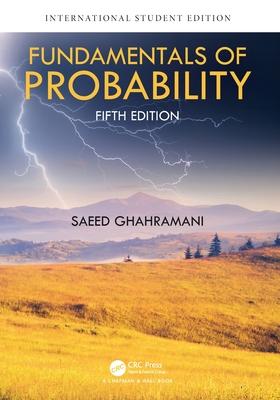Praise for the fourth edition:
"This book is an excellent primer on probability .... The flow of the text aids its readability, and the book is indeed a treasure trove of set and solved problems. --Dalia Chakrabarty, Brunel University, UK
"This textbook provides a thorough and rigorous treatment of fundamental probability, including both discrete and continuous cases. The book's ample collection of exercises gives instructors and students a great deal of practice and tools to sharpen their understanding."
--Joshua Stangle, University of Wisconsin - Superior, USA
This one- or two-term calculus-based basic probability text is written for majors in mathematics, physical sciences, engineering, statistics, actuarial science, business and finance, operations research, and computer science. It presents probability in a natural way: through interesting and instructive examples and exercises that motivate the theory, definitions, theorems, and methodology. This book is mathematically rigorous and, at the same time, closely matches the historical development of probability. Whenever appropriate, historical remarks are included, and the 2096 examples and exercises have been carefully designed to arouse curiosity and hence encourage students to delve into the theory with enthusiasm.
New to the Fifth Edition:
In this edition, a significant change has been made in the order of material presentation.
The topics such as the joint probability mass function, joint probability density functions, independence of random variables, sums of random variables, the central limit theorem, and certain other materials have been covered earlier in the book, enabling students to grasp these crucial concepts from the start. These changes have considerable merit, particularly the idea of covering the celebrated central limit theorem immediately after discussing the normal distribution. Additionally, discussions on sigma fields are provided and an in-depth section on characteristic functions is added. The central limit theorem has been proven using both moment-generating functions and characteristic functions.
In the present edition, numerous new figures are included that were drawn for the first time, specifically to aid in students' understanding of the material. These fresh illustrations, along with all the previous ones in the book, have been meticulously crafted by the technical support team at CRC.
Instructors who prefer the content arrangement used in previous editions can still teach the material in the same order as those editions. Moreover, the homepage of this book contains a whole chapter with comprehensive coverage on Stochastic Processes as well as additional contents for Chapters 1 to 10, such as extra examples, supplementary topics, and practical applications to facilitate in-depth exploration. Furthermore, it offers thorough solutions for all self-tests and self-quiz problems, empowering students to assess their progress and grasp of this demanding subject.
In this new edition, at the end of select chapters, sections are included dedicated to exploring approximate solutions for complex probabilistic problems using simulation techniques. These simulations are conducted using the R software, a powerful tool well-suited for probabilistic simulations due to its extensive collection of built-in functions and numerous specialized libraries designed for various simulation purposes. In the homepage of the book, a chapter, titled "Algorithm-Driven Simulations," is presented in which we delve deeply into the concept of simulation using algorithms exclusively, without being tied to any specific programming language.
